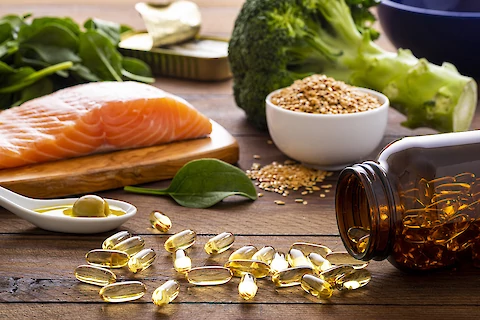
As we age, prioritizing proper nutrition becomes crucial. Omega-3 fatty acids, renowned for their myriad health benefits, are particularly vital for senior well-being. These nutrients are key players in promoting cognitive function, sustaining heart health, and enhancing the overall quality of a senior's diet.
The Basics of Omega-3s
Omega-3 fatty acids are a type of polyunsaturated fat. The body cannot produce them naturally, making them an essential part of our diet. These fats come in three primary types: Alpha-linolenic acid (ALA), Eicosapentaenoic acid (EPA), and Docosahexaenoic acid (DHA). ALA is commonly found in plant sources. EEPA and DHA are plentiful in fish and other seafood. The body utilizes these fats in many ways, including cell function, inflammation regulation, and supporting brain health.
Benefits of Omega-3s for Seniors
Cognitive function and heart health are two of the most critical areas where Omega-3s can make a notable difference in a senior's well-being. Omega-3s, particularly DHA, play a significant role in maintaining brain health. They contribute significantly to forming nerve cells in the brain, supporting memory and cognitive functions. A diet high in Omega-3s can reduce the risk of developing Alzheimer's disease and dementia.
Omega-3s are also known for their heart-friendly properties. They help decrease triglycerides, lower blood pressure slightly, and reduce blood clotting. Omega-3s also decrease the likelihood of stroke and heart failure. Regular intake of Omega-3s may slow down the development of plaque in arteries, an essential factor in reducing heart disease risk.
Omega-3 Rich Foods
Many foods are naturally rich in omega-3s. Cold-water fish like salmon, mackerel, and tuna are excellent sources. For vegetarians or those allergic to fish, walnuts, chia seeds, flaxseeds, and hemp seeds are great alternatives. They are rich in ALA, which the body can partially convert to EPA and DHA. Another plant source, algae, offers both EPA and DHA and is a common supplement ingredient.
Omega-3 Supplements
Supplements can help bridge nutritional gaps when it's challenging to get sufficient Omega-3s from food alone. Quality supplements typically contain EPA and DHA, derived from fish or algae. However, it’s best to consult a healthcare provider before starting any nutritional supplement regimen. They can interact with medications or exacerbate certain health conditions, so proper guidance is in order.
Integrating Omega-3s into a Senior's Meal Plan
Adapting a senior's diet to include these foods can be a creative and enjoyable process. It often involves adding Omega-3-rich foods to daily meals and possibly introducing supplements. The key is to make changes feel less like a strict diet and more like a pleasing shift in lifestyle.
A bowl of oatmeal topped with flaxseeds and walnuts can be a great breakfast meal. Lunch could entail a tuna salad. Dinner could feature grilled salmon. If a senior enjoys salads, consider adding a topping of crushed walnuts or chia seeds. Snack times might feature a handful of walnuts or a spread of avocado on whole-grain toast.
Get More Help Maintaining Your Senior Loved One's Health
Incorporating Omega-3s into senior diets is a simple yet powerful way to promote overall health and well-being. If you’re based in West Chester, Coatesville, Downingtown, Kennett Square, or Chester County and need help in senior care or nutrition, we can help. Our in-home care professionals can help with everything from companionship and personal care to meal prep. Contact Senior Helpers Exton to learn more.